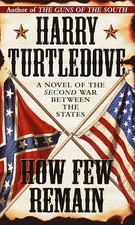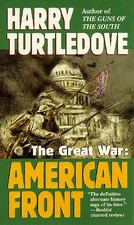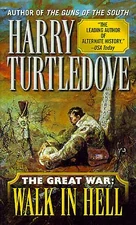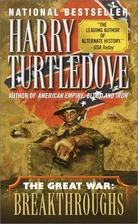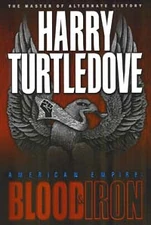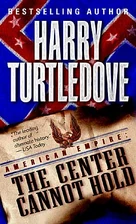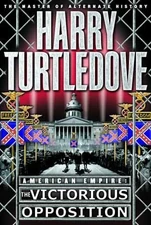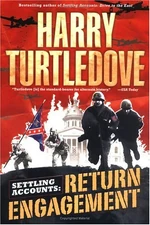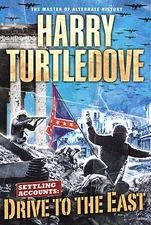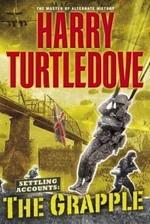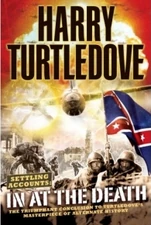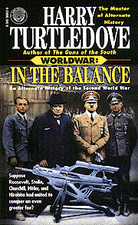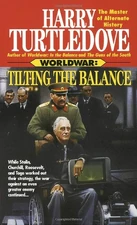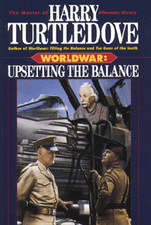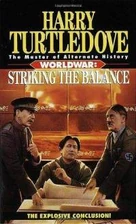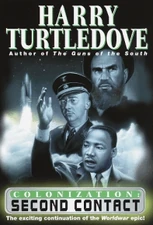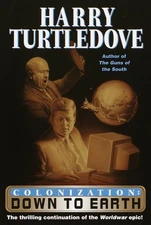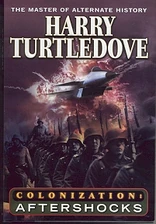International law is the term commonly used for referring to the system of implicit and explicit agreements that bind together sovereign states in adherence to recognized values and standards. It differs from other legal systems in that it primarily concerns states rather than private citizens
International Law in Southern Victory[]
The Geneva Convention and treatment of POWs[]
The Geneva Conventions were in place from the end of the 19th Century, providing for the fair and humane treatment of Prisoners of War - which proved very lucky for the numerous soldiers captured by the opposing side in the course of the Great Wars.
In general, all fighting powers found it better to respect the terms of the Geneva Convention; for example, captive US soldiers held at Andersonville during the Second Great War were far better treated than the ones held there during the War of Secession, when the Geneva Conventions had not yet been signed.
However, in the black guerrillas' war with Jake Featherston's Confederate forces, no convention had been observed and prisoners were usually put to death upon capture. In the last stages of the war, the advancing US forces - which took up the guerrillas as auxiliaries but avoided enlisting them as part of the US Army - on some occasions failed to punish these auxiliaries for mistreating or killing Confederate POW's, in acts of revenge for the Population Reduction.
Usages of war[]
International Law was also clearly established since the end of the 19th Century on other points regarding the behavior of soldiers - for example, that only members of an armed force wearing its uniform were considered legitimate belligerents, while those putting on an enemy uniform forfeited all protection and could be executed upon capture. The same applied also to those continuing belligerent actions after their government had signed an armistice or surrender.
Belligerency after the signing of an armistice: The "Ericsson" Case[]
The latter point gained considerable public attention in the early 1920's, over the notorious case of Confederate submarine captain Roger Kimball having ordered the sinking of the USS Ericsson after the 1917 armistice, ending the First Great War, had gone into effect.
From the point of view of International Law, the Ericsson Case was quite clear. Given that Kimball's former second-in-command Tom Brearley was willing to testify that he had indeed knowingly and intentionally ordered the sinking after the armistice came into effect, the former sub captain would likely been found guilty had he been either extradited to the US or tried by the Confederacy's own judicial system - at that time, prior to Jake Featherston's rise to power, still independent and fairly impartial. However, Kimball was never tried; rather, he was assassinated by Sylvia Enos, widow of one of the American sailors killed in Kimball's attack on the Ericsson.
Prima facie, Enos should have been convicted of premeditated murder, as she had admitted coming all the way from Boston to Charleston with the specific purpose of killing Kimball. In allowing her to go free and return to the US, the Confederacy judicial system in a lopsided way admitted that it had been at fault in failing to prosecute Kimball, leaving the widow of his victim no recourse but to take the law into her own hands.
Dressing in enemy uniform: General Clarence Potter and the bombing of Philadelphia[]
The issue of soldiers dressing in enemy uniform was at the crux of the case "United States vs. Clarence Potter" (1944).
In the last stages of the Second Great War, Confederate general Clarence Potter, leading a small elite force all dressed in US uniforms and driving vehicles painted with US Army markings, succeeded to smuggle the only superbomb produced by the Confederacy into Philadelphia, where it detonated and caused enormous death and destruction.
Had Potter and his men been caught wearing the US uniforms, they would likely have been executed out of hand - as International Law allowed, and because US public opinion was shocked and angry at what they have perpetrated. However, Potter managed to get back across the lines, and though captured later he was given a quite fair trial, with defense attorneys doing their best for him.
The key moment was the testimony of American General Irving Morrell, fresh from his successful campaign which brought the Confederacy to its knees, who showed magnanimity in testifying on Potter's behalf and admitting the US forces had also resorted to dressing in Confederate uniforms.
Due especially to Morrell's testimony, the US court, in manifest reluctance, found Potter not guilty. US Brigadier General Stephens, the presiding judge, stated that "Carrying on the fight in the uniform of the foe skates close to the edge of laws of war" and was "a ruse of war frowned on by the Geneva Convention" (rather than stating, as was the general opinion previous to this ruling, that this was an outright violation of the Geneva Convention). He went on to state that "However, it has been demonstrated beyond a reasonable doubt that US forces also utilized the identical ruse of war" and therefore "executing a man on the other side for something we also did ourselves strikes the court as unjust, however much we wish it did not".
The ruling in the Potter case left a very ambiguous legal and practical situation. On the one hand, the relevant clause of the Geneva Convention had not been abrogated, and other countries were not bound by the precedent created by the American court, so that soldiers in other wars caught using this "ruse of war" might still risk being executed; on the other hand, those resorting to such executions would be on a shakier ground than on before this ruling was made.
Literary Note[]
The above circumstances did not occur in the actual World War II or other wars of actual history. However, a case comparable in its general outlines, which might have inspired Turtledove, did occur during the Nuremberg Trials of Kriegsmarine Grand Admiral Karl Donitz. He was accused of having broken International Law by issuing the infamous War Order No.154 under which crews of German U-boats were expressly forbidden to rescue the crews of ships sunk by them, on the grounds that such rescue could endanger the submarine itself. These charges against Dönitz were dropped when it was shown that British submarines were given similar orders [1].
Treatment of Civilian Populations[]
Until the end of the Second Great War, International Law dealt only in a very limited way with the situation of civilians in wartime, and placed few limitations on how an occupying army could treat the occupied population, and even less on how a state may treat its own citizens or subjects (a point considered a purely internal matter, in which other states were not to interfere). In 1944-5 this legal situation changed radically in some aspects, but hardly at all in others.
Crimes Against Humanity[]
Even before the end of the war, US forces in Texas discovered the mass graves of some million Blacks murdered in Camp Determination, and the shocking revelation went reverberating around the world. By the time of the Confederate surrender, the United States' judicial system was in possession of a considerable body of evidence about the Population Reduction and the chief persons implicated in perpetrating it. A series of trials were held soon afterwards on the newly defined charge of "Crimes against Humanity", breaking completely new ground on many fundamental judicial issues.
The cases of "United States vs. Ferdinand Koenig", "United States vs. Jefferson Davis Pinkard", "United States vs. Mercer Scott" and other defendants all ended with a "guilty" verdict, once it was proven that the defendant had been indeed personally involved in the systematic hunting down and killing of Blacks, for the sole reason that they were such. In all cases, requests for a pardon were turned down and execution took place within a short period after the verdict.
The defense attorneys in all cases tried virtually identical lines of defense - i.e., that the killing of the Blacks was legal under the laws of the Confederacy as they stood under the rule of Featherston, that treatment of the Black "residents" of the Confederacy was its own internal affair which was not the concern of outsiders, that the defendants had acted under the direct orders of their superiors (the others from Koenig, and Koenig from Featherston, who himself did not live to stand trial) and that the government issuing these orders was the legal government of the Confederacy, which had been recognized as such by the United States itself.
All these lines of argument were, however, rejected out of hand by the courts, which ruled that certain acts are so monstrous as to be inherently illegal, and that no laws made by a specific state at a specific time could make them legal; that persons were duty bound to refuse participation in such acts, even when ordered to by a government, and could be made criminally accountable for having taken part in such acts; and that other powers had the right to intervene and bring such people to justice according to their own laws.
A rather different juridical aspect was introduced in the case of "United States vs. Saul Goldman". Goldman's lawyers contended that, even granted that persons involved in killing Blacks could be tried by US courts, there was no evidence that Goldman was involved in such acts and only circumstantial evidence to show that he even knew the killings were going on.
These arguments, however, were also rejected by the court. Considerable evidence was produced showing that Goldman had over many years directed the systematic and extensive production of radio broadcasts, newspaper articles, films and newsreels all deliberately and intentionally designed to present Blacks as bestial subhuman and/or dangerous and scheming enemies of white Confederates. Therefore, the judges ruled that without having ever shot a bullet or poured cyclone gas into a gas chamber, by making Confederates feel that Blacks deserved to be killed Goldman had played a substantial role in making their mass murder possible. The US authorities deliberately took care to hold concurrently the trials - and afterwards, the executions - of Koenig and Goldman.
This series of trials changed irrevocably the face of International Law and the terms of reference under which all future jurists would operate henceforward. Still, its force was lessened by the fact that the United States decided to act unilaterally, putting the murderous Confederate officials on trial in its own courts without trying to involve other nations - not even its own allies in the just-concluded war - in setting up an International Court and/or drawing up a new treaty dealing with the systematic mass killing and extermination of an entire category of people (no specific name for this kind of crime was yet agreed upon).
In truth, however, the US had few real options for acting in this manner. Neither of the Great Wars had resulted in the creation of an international organization with any claim to impartiality, under whose aegis an International Court might have operated. Also, the United States' main ally, Germany, had only been peripherally involved in pulling Featherston down - and conversely, it had maintained a decades-long alliance with the Ottoman Empire, without ever voicing a clear objection to that Empire's mass murder of its Armenian subjects, known to have served as an inspiration and precedent to Featherston. Thus Germany had no interest in associating itself with the US pursuit of Crimes Against Humanity, and might have been embarrassed by any such association.
Execution of Hostages and Collective Punishments[]
At any point of time since 1914, there were considerable territories under military occupation of one power or another. In some of them, occupation was the formal legal status - often open-ended and designed to last indefinitely, such as in Canada after 1917 and in the Confederacy after 1944. Others were parts of a state's sovereign territory, placed under prolonged martial law after the suppression of a revolt, such as Mormon Utah Similar situations existed also on other continents.
In both Great Wars, virtually all belligerent powers were at one stage or another in occupation of somebody else's territory, and the issue of the war concerned mainly who would end up occupying whom. Collective punishment - and in particular, the taking of random hostages from a town's population and executing them in retaliation for the killing of the occupying force's military personnel - was considered a legitimate measure and a standard operating procedure for all occupying armies. Indeed, with the US after 1944 needing to simultaneously keep down Confederacy, Canada and Utah, the scope of hostage executions went sharply up, with such gruesome peaks as the execution of no less than 1500 random hostages on a single day at Miami, in retaliation for a bombing in which 31 US sailors were killed in an attack on a ship cruising offshore.
While the troops detailed to act a firing squads for the hostages were increasingly nauseated by this duty, political and military decision-makers remained convinced of its legitimacy (though not always of its efficacy). While independent jurists might decry such measures as barbaric and dream of extending the Geneva Convention to include protection of civilians under occupation, none of the major powers whose adhesion would be needed for such a convention showed any inclination in this direction.
The same went for the bombing of civilian populations by superbombs and destruction of whole cities. After 1944, the world's major powers were divided between those who had already inflicted such destruction on their foes' cities and those who dreamed of gaining the power to do so by the time of the next war. Neither showed any inclination to outlaw the use of that measure.
Thus, after 1944 International Law made an important stride in clearly criminalizing the systematic extermination of an entire ethnic group - but failed to follow this up by forbidding lesser, but still horrifying, measures.
International Law in Crosstime Traffic[]
International Law in The Valley-Westside War[]
The numerous mini-states which arose in the former territory of the United States following the devastating nuclear war of 1967 gradually developed agreed usages in their relationship to each other, these being partly derived from the usages of nation states in the Old Time and partially developed out of the practice of the post-cataclysm century and half. Like the sovereign states of the Old Time, the post-cataclysm states exchanged ambassadors with each other. Such ambassadors enjoyed diplomatic immunity, and in case of war, the ambassador of a belligerent state was escorted safely to the border. However, in such cases the custom arose - unknown in the Old Time - of making such a departing ambassador ride facing backwards all the way to the border, and while not physically harmed being exposed to jeering and humiliation from the accompanying crowd.[1]
In the last decades of the Old Time, military forces occupying the territory of another state were subject to strict restrictions under the Fourth Geneva Convention of 1949. Such acts as collective punishments and the taking of hostages were completely forbidden and defined as war crimes. However, in the chaotic times after 1967 the Fourth Geneva Convention was forgotten, and though the United States had been a signatory to it, none of the numerous successor states was. By the 21st Century, the practices forbidden by that Convention became once again acceptable. For example, when soldiers of The Valley occupied part of the Westside territory, they detained and hanged five random civilians in retaliation for the killing of a Valley soldier, and threatened "to hang ten if it happens again". This was considered normal and acceptable practice by the standards of the time.[2]
The Red Cross on medics' smocks continued to be honored with soldiers on either side not deliberately shooting at them. although accidents did happen. It wasn't considered "sporting" to do so.[3]
Universal Jurisdiction across timelines[]
The discovery of alternate timelines and the creation of the Crosstime Traffic Company empowered to regularly act in these timelines, made necessary some innovative legislation. International Law has long before recognized for certain offences - starting with Piracy, and later extended to Crimes Against Humanity - the principle of "Universal Jurisdiction", whereby sovereign states could claim criminal jurisdiction over persons whose alleged crimes were committed outside the boundaries of the prosecuting state. This was now extended also to crimes committed in an altogether different timeline.
Persons from the home timeline were deemed to be bound by its laws even when in another timeline. The unauthorized entering into and exploring of other timelines was an offence in itself, made more grave if there was evidence of any mistreatment or exploitation of local inhabitants.
In particular, home timeliners were criminally liable - and likely to be severely punished - for enslaving any person, even in a timeline where it was legal under local law. Courts in the home timeline were empowered to try persons alleged to have engaged in slaving, or for being an accessory to such an offence (as in the case of Bridget Mallory). A home timeliner killing a slave counted as murder, even if the act was committed in a society where local law permitted a master to kill a slave; similarly, beating or mistreating a slave counted as assault, even where it was permitted by local law.
Law enforcement agents from the Home Timeline were empowered to cross into other timelines in order to apprehend such persons. If the suspected criminals were in large numbers and strongly entrenched - as in the case of the renegade Crosstimers who established a slave estate in a low-tech alternate Spain - it was permissible for whole military units (in this case, loaned by the Spanish Army) to cross over and help in the apprehension.
People from other timelines could, if necessary, be brought as witnesses for the acts committed by home timeliners - but were not themselves liable to prosecution. The Home timeline's legal system in no way asserted any Universal Jurisdiction over the inhabitants of other timelines, however reprehensible their acts might be under the Home Timeline's legal and moral standards.
International Law in Worldwar[]
In the distant past of The Race, Home was divided into various competing states and empires, which developed a system of diplomatic relations with each other and of Ambassadors carrying out such relations. Once the planet was unified into a single empire, all that became obsolete, but the tradition-bound Race preserved the information - for example, the pattern of body paint proper to an Ambassador. This information was also included in the data carried by the expedition which set out to conquer Tosev 3. After the Peace of Cairo the Race had need again of diplomatic relations, which were based partly on the laws and usages prevailing among the Tosevite not-empires, which the Race adopted and adapted to its own use, and partly on the Race's own ancient usages.
References[]
- ↑ The Valley-Westside War, pgs. 30-31, hc.
- ↑ Ibid., pg. 86.
- ↑ Ibid., pg. 219.
| |||||||||||||
| |||||||||||||||||||||||||
